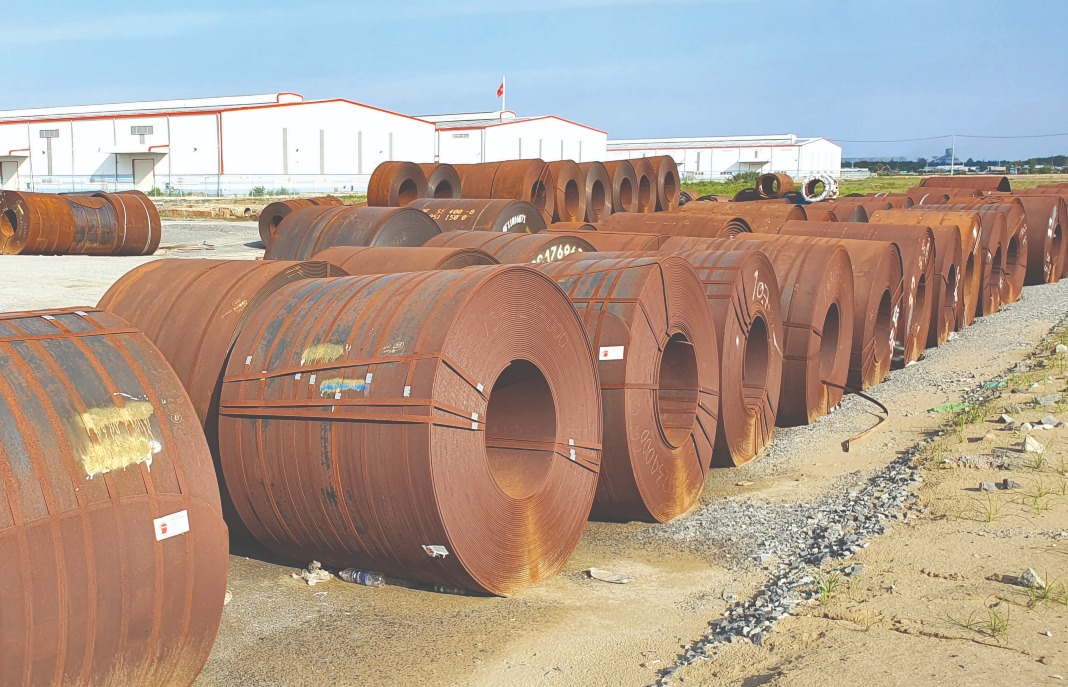Listed companies are entering the peak season when their business results for the first quarter of 2023 will be made public. As previously forecast, quite a few enterprises suffered a sharp decline in their profits, or even made losses.
Risks from volatile prices, stagnant consumption
This came as an inevitable consequence considering the many hardships industry groups have been grappling with since the fourth quarter of 2022: a fall in the number of new orders, weakening import and export activities, consumption getting sluggish or completely frozen in certain sectors such as real estate and construction, plus a surge in financing costs as interest rates have markedly shot up compared to the previous period.
Steelmaking is one of the gloomiest industries, although only a few companies have issued their financial statements for the first quarter of 2023. Hoa Sen Group (HOSE: HSG) suddenly reported a loss of more than VND680 billion for the first quarter, a serious downturn against the profit of VND638 billion in the same period last year (fiscal year at Hoa Sen lasts from October 10 to September 30).
Another loss-making steelmaker is Thai Nguyen Iron and Steel Joint Stock Company (UPCoM: TIS), with a loss of VND19 billion versus a profit of VND42 billion in the year-ago period. Also, its net revenue dropped 35% year-on-year to some VND2.44 trillion. This is the third consecutive quarter this steel company has suffered a loss.
Me Lin Steel Joint Stock Company (HNX: MEL) posted a net profit of VND2 billion, down 82% over the same period last year, while VICASA Joint Stock Company (HOSE: VCA) reaped a modest profit after tax of VND5 billion, down 40% year-on-year.
The struggling real estate market and the limited demand for construction have dealt a hard blow to industries such as building materials, especially steel. For instance, although steel prices have recently shown signs of recovery, they are still much lower than in the first half of 2022.
The risk from price fluctuations is also what businesses in the rubber industry are coping with. Tay Ninh Rubber Joint Stock Company (HOSE: TRC) reported a 50% decline in its net profit compared to the same period last year, to nearly VND3 billion, mainly due to the fact that the selling price of rubber latex in the first quarter of this year was lower than in the year-ago period.
Specifically, the average selling price of this item in the first three months of 2023 was VND33.3 million per ton, a fall of VND8.2 million or 20% year-on-year. Similarly, Phuoc Hoa Rubber Joint Stock Company (HOSE: PHR) made a profit of VND172 billion, 42% smaller than in the same period last year, whereas Dak Lak Rubber Investment Joint Stock Company (UPCoM: DRI) earned nearly VND15 billion, down 29% year-on-year.
Ailing economy
Regarding securities companies, although the market performance in the first quarter displayed signs of improvement compared to the second half of 2022, many industry players still witnessed a sharp decline in their profits over the same period last year. For example, KIS Vietnam Securities Corporation posted an after-tax profit of only VND79 billion for the first quarter, down 43% year-on-year. Likewise, the Q1 profit before and after tax of MB Securities Joint Stock Company (HNX: MBS) was respectively VND152 billion and VND121 billion, a drop of 40% from the record high set in the first quarter last year. Meanwhile, leaders of Viet Dragon Securities and Viet Capital Securities estimated their profits would plummet by 40% and 80% over the same period in 2022, respectively.
As per their financial statements, the operating revenue of all the securities companies above plunged, mainly in brokerage and margin lending, as the stock market experienced a thriving period in the first quarter of 2022 before things started to go south in the second quarter. Besides, stock prices remain much lower than in the same period last year, leading to a drastic reduction in the fair value through profit or loss (FVTPL) of securities companies or even losses.
In addition, lower-than-expected economic growth, a narrowing scale of production and the fear of stepping up investment have badly hit the power industry as electricity consumption goes down. As reported by Hai Phong Thermal Power Joint Stock Company (UPCoM: HND), its pre-tax profit was a mere VND10.7 billion, a sharp decrease from nearly VND272 billion in the same period last year. The company ascribed such a decline in profit to the fact that electricity output in the first quarter of 2023 dwindled against the same period last year, whereas the price of coal picked up year-on-year, resulting in higher fuel costs. Meanwhile, PetroVietnam Power Corporation (HOSE: POW) has recently estimated a profit of nearly VND579 billion, down 34% over the same period in 2022.
A number of other companies whose financial statements for the first quarter have been published also suffered a big year-on-year drop in their net profits, including Atesco Pharmaceutical Group Joint Stock Company (HNX: ATS) with a fall of nearly 95%, Foreign Trade and Investment Development Joint Stock Company of HCMC (HOSE: FDC) with 91%, TDG GLOBAL Investment Joint Stock Company (HOSE: TDG) with 77%, Vinh Phuc Infrastructure Development Joint Stock Company (HNX: IDV) with 47%, Viettronics Tan Binh Joint Stock Company (HOSE: VTB) with 44%, Saigon Fuel Joint Stock Company (HOSE: SFC) with 46%, First Real Joint Stock Company (HOSE: FIR) with 44%, etc.
Will Q2 be any better?
That said, in a picture with too many dreary colors, there are still bright spots, which are those companies managing to sustain their growth.
Citing the securities industry as an example, despite the prevailing downward trend at most enterprises, the Bank for Investment and Development of Vietnam Securities Joint Stock Company (HOSE: BSI), albeit a reduction in revenue, still achieved VND121 billion and VND98 billion, respectively, as its profit before and after tax, up 27% and 17% over the same period in 2022, the highest in the last five quarters.
Such a result was partly thanks to margin lending since loans and cash advances provided by BSI by the end of the first quarter had amounted to nearly VND3.49 trillion, an addition of VND533 billion to the total sum at the beginning of the year, of which margin loans alone increased VND695 billion to VND3.39 trillion, or 0.76 time the company’s equity. Also, BSI has seen its stock price rise by more than 60% since mid-March.

In the power industry, Power Investment Joint Stock Company No. 3 (HNX: PIC) reaped a profit after tax of over VND21.4 billion, up 34% over the same period last year. As explained by the company, it was rainy in the area of Dak Pone and Da Krong 1 hydroelectric plants in the first quarter of 2023, making it favorable for electricity generation, contributing to the total commercial power output of 33.24GWh, a surge of over 31% year-on-year. Along with that, electricity sales grew nearly 25%, bringing in more than VND45 billion.
With the recently adopted fiscal expansion policies and monetary easing, the economy is expected to prosper from the second quarter onward, making the situation brighter for production and business activities. Moreover, the downward trend of interest rates will positively impact the consumption of products and help enterprises minimize financial costs.
For securities companies, in particular, the improving market liquidity, the signs of a stronger shift in cash flows into this sector, and the higher demand for margin loans will offer them a better source of income in the coming time, possibly right in the second quarter.









